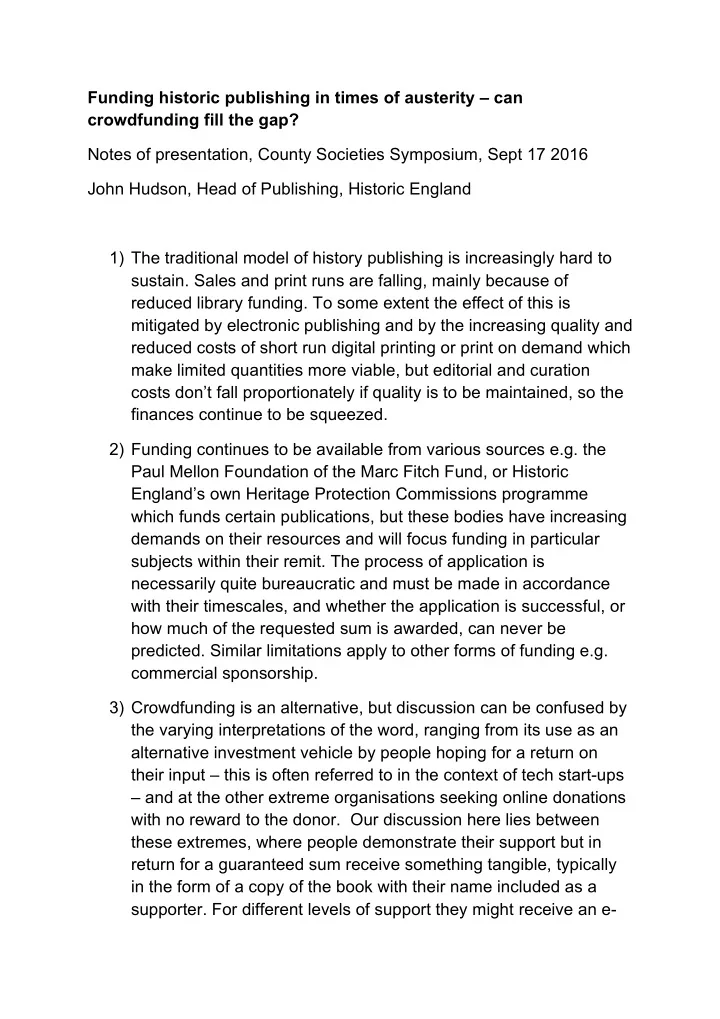

Funding historic publishing in times of austerity – can crowdfunding fill the gap? Notes of presentation, County Societies Symposium, Sept 17 2016 John Hudson, Head of Publishing, Historic England 1) The traditional model of history publishing is increasingly hard to sustain. Sales and print runs are falling, mainly because of reduced library funding. To some extent the effect of this is mitigated by electronic publishing and by the increasing quality and reduced costs of short run digital printing or print on demand which make limited quantities more viable, but editorial and curation costs don’t fall proportionately if quality is to be maintained, so the finances continue to be squeezed. 2) Funding continues to be available from various sources e.g. the Paul Mellon Foundation of the Marc Fitch Fund, or Historic England’s own Heritage Protection Commissions programme which funds certain publications, but these bodies have increasing demands on their resources and will focus funding in particular subjects within their remit. The process of application is necessarily quite bureaucratic and must be made in accordance with their timescales, and whether the application is successful, or how much of the requested sum is awarded, can never be predicted. Similar limitations apply to other forms of funding e.g. commercial sponsorship. 3) Crowdfunding is an alternative, but discussion can be confused by the varying interpretations of the word, ranging from its use as an alternative investment vehicle by people hoping for a return on their input – this is often referred to in the context of tech start-ups – and at the other extreme organisations seeking online donations with no reward to the donor. Our discussion here lies between these extremes, where people demonstrate their support but in return for a guaranteed sum receive something tangible, typically in the form of a copy of the book with their name included as a supporter. For different levels of support they might receive an e-
book or perhaps an invitation to a ‘premium’ event for a larger sum. 4) The heritage sector is well-suited to this approach as people tend to form groups around the landscapes, buildings or towns they love, often concentrated in a particular locality, so can be easy to identify and contact. Heritage bodies often have access to attractive or interesting places to host events connected with the campaign. 5) Historic England Publishing has conducted a successful crowdfunding campaign for Place-making; The Art of Capability Brown. The technology partner used was the book-specific Unbound, but other funding platforms are available – Kickstarter and CrowdCube are amongst the best-known, but there are many. Support came initially from the author’s personal and professional network, then HE supporters and staff responding to bulletins, e- newsletters and social media, and also from existing contacts of Unbound. Pledges were for a standard hardback book including the names of supporters and signed by the author, or for an e- book, with names also included in the printed book. A plan to include a ’premium’ offer of a masterclass in the form of a walk through a Brown landscape with the author had to be shelved because the costs of catering etc. were not under our control – an important lesson. On the strength of this, we have plans to fund other titles in a similar way. 6) Advantages of this approach – a) Offers people the opportunity to show support in a tangible way, when the scope for volunteering, for example, is limited. b) An inexpensive way to be philanthropic – much less than dedicating a theatre seat or a park bench, for example, being in the tens of pounds, not hundreds. c) Inclusive and democratic. Not dependent on a wealthy individual, company or organisation, but the outcome of a group of ordinary people combining to support a common cause.
d) The process and timescale is under control of the organisation, and not the dictates of funding bodies. Very little bureaucracy, though it does require considerable admin and organisation. 7) Historic England Publishing has launched a service under which we will publish in association with heritage bodies, with crowdfunding accounting for all or part of the cost – in some cases it may be combined with other funding mechanisms. The client body will arrange authorship, and books will be peer-reviewed and published to the standards of Historic England, and be ‘substantial’ – not for the souvenir guide market which is already well-served by other suppliers. Where relevant, images from the Historic England Archive will be available for inclusion. Publication will only go ahead when funding has been raised to supply an agreed number of copies, and additional copies will be produced which HE Publishing will promote and sell through the usual book trade channels and on its website, ensuring the book is included in the main international bibliographic databases and is widely available to scholars and the wider public. 8) For information about the publishing service contact John Hudson at john.hudson@historicengland.org.uk or on 01793 414453
Recommend
More recommend